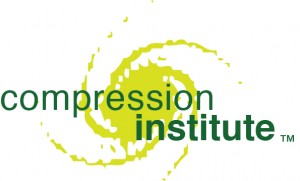 Compression Thinking is collectively learning to enjoy living on our spaceship planet by becoming much wiser much faster. Compression Thinking differs from most initiatives to improve ecological sustainability in three primary ways:
Compression Thinking is collectively learning to enjoy living on our spaceship planet by becoming much wiser much faster. Compression Thinking differs from most initiatives to improve ecological sustainability in three primary ways:
1. Make huge reductions in total global resource use, not just fossil fuels.
2. Reverse the growth in use of natural resources. Technical substitutions won’t do this. In a zero-sum world, we have to change how we think about economies and work organizations, putting the planet before other considerations, as in the figure shown. This contrasts with the usual triple bottom line diagram. We’re stuck having to change how we think.
3. Organize to learn how to become much more effective while using much less. We call this becoming a Vigorous Learning Enterprise.
Compression Thinking has to overcome assumptions of unlimited expansion embedded in daily life. On a big scale, economic arguments differ merely on how to restart growth. Small scale, we expect a savings plan to grow for a nice retirement. Most CEOs regard top-line, bottom-line financial growth as success, and it is in an expansionist world. However, a few interpret “growth” to mean an adaptive learning organization, regarding a company as its people and more than a financial entity. They realize that financial performance does not signify excellent long-term operational performance, and that an organization can grow too big to perform well.
Just imagining life on a spaceship frees minds from expansionist assumptions. On a spacecraft not re-supplied from earth, life obviously depends on artificial life support systems. It’s on its own to convert radiation (as from the sun) into complex life support.
Energy management would be crucial. Too little radiation, and every erg gleaned could still not keep everyone alive. Too much would either fry or mutate all life on board. Life, including the human population, could not expand beyond the walls of the craft or the capacity of its life support system. Maintaining the balance of life on board is too complex for a centralized super computer to handle, so the system would be diffused, and mostly self-correcting. Creating such a system from scratch to operate in perpetuity is so far beyond us technically and emotionally that it is reason enough to learn faster than ever before. We know too little about the life support system we have here now.
Unlike small spacecraft, no one can see “Spaceship Earth” as a whole except from space, so its finite nature is harder to grasp, but once this abstraction sinks in, it prompts fundamental questions, beginning with: What’s the purpose of life? Then operational fundamentals: What is work? Efficiency? Property? Money? Education? Security? ….
That is, Compression Thinking compels us to learn a lot more about everything, including ourselves, and systemically: How does it all work together? Such a question has no fixed “answers” because none exist. The universe is always changing, and we with it. A Compression Thinker is a rational optimist. Psychologically, we have to stay pumped, else when faced with unknown perils in a future never unmasked before its time, we give up. Linking earth’s spaceship problems to local action is the challenge of Compression Thinking.
Of all fundamental questions, our usual guide is “What is success?” If our “answer” relates to financial growth, we assume unlimited expansion even if we hedge it with moral conditions.
Those who adopt Compression Thinking look at the world differently. Our “answers” for success will differ – social acclaim or anything else we covet for quality of life. However, most “answers” unconsciously assume continued existence, so it has top priority.
The key question is how does what I/we do on this little corner of the spaceship affect the whole thing? Compression Thinking, looking at the world differently, affects everything in addressing that question. Boundless more questions whelm over us. This starter list of “principles” will be addressed in future issues:
- Question all assumptions: learn the “arts of asking questions and creating dialog.”
- Seek physical reality first – by “gemba walks,” by other means, and from multiple viewpoints.
- Seek long-term effectiveness over short-term; quality over quantity, always.
- Precautionary principle: Those taking action should first do no harm.
- Contextual or systems thinking: what affects what, far removed in time and space.
- Tools: PDCA, Life Cycle, Mass-Energy balance, lean tools, dialog methods, etc.
- Learn to resolve emotional differences (so-called “wicked problems”).
- Create vigorous learning within work organizations.
- Learn to transform business models or operating doctrines, seeking “non-traditional” possibilities.
